In the modern, fast-paced world, eCommerce has become a powerful tool for agencies to extend their attainment, boom sales, and establish a solid online presence. However, managing an eCommerce business may be worrying, and entrepreneurs can also need help specializing in core skills and strategic growth.
It is where outsourcing eCommerce becomes a game-changer. By delegating various operational aspects of their online business to specialized professionals, entrepreneurs can leverage external service providers’ expertise, resources, and scalability, allowing them to achieve maximum results while freeing valuable time to concentrate on critical business objectives.
This comprehensive guide will delve into outsourcing eCommerce and unveil the strategies, benefits, and best practices that can transform your business. From managing inventory and order fulfillment to customer service and digital marketing, we will explore how outsourcing can streamline your operations and fuel your business growth.
Statistics and References
To clear light on the growing tendency of outsourcing in the eCommerce industry, let us take a glimpse at some exciting statistics:
✔︎ According to a survey performed by Deloitte, 59% of companies outsource to lower costs, while 57% outsource to concentrate on core business operations.
✔︎ The international market size of the outsourced benefits industry achieved $92.5 billion in 2019 and is projected to extend at a CAGR of 8.5% from 2021 to 2028.
✔︎ A report by Statista discloses that 78% of small and medium-sized eCommerce companies in the United States outsource at least one business approach.
These statistics underscore the importance of outsourcing in the eCommerce geography and why businesses are increasingly adopting this approach to optimize their functions.
Also Read: Mistakes to Avoid while Outsourcing the Mobile App Development
Why Do We Need to Outsource eCommerce Development in 2023?
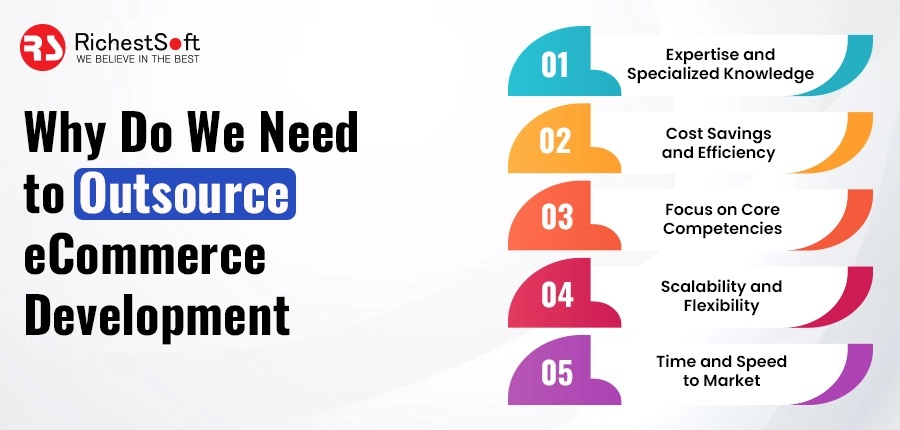
The world of digital business is rapidly changing, especially in 2023. Online shopping has become more popular, making eCommerce a dominant force. Companies must establish a strong eCommerce presence to stay ahead of the competition. Outsourcing eCommerce development has become a necessary strategy for businesses of all sizes to achieve this and unlock their growth potential.
Here, we will explore why outsourcing eCommerce development in 2023 is crucial for businesses aiming to thrive in the ever-competitive online marketplace. From expense savings and permit to specialized expertise to scalability and enhanced efficiency, we will examine the benefits that outsourcing brings to the table. So, let’s delve into the key reasons why you should consider outsourcing eCommerce development this year.
1. Expertise and Specialized Knowledge
eCommerce development is a complex process that requires expertise in various domains, such as website design, user experience, security, payment gateways, and mobile responsiveness. You can access a team of skilled professionals specializing in these areas by outsourcing eCommerce development. These experts stay updated with the latest industry trends, technologies, and best practices, ensuring your online store is built with proficiency and functionality.
2. Cost Savings and Efficiency
Cost savings are one of the main reasons for outsourcing eCommerce development. In-house development teams can be expensive to establish because they need to pay for continuous salaries and benefits, infrastructure and equipment purchases, and new hire training and onboarding. By outsourcing, you may eliminate these overhead expenses and choose a flexible price structure that fits your company’s requirements. It also enables you to speed up app development processes while utilizing outside teams’ skills and knowledge to provide adequate and timely outcomes.
3. Focus on Core Competencies
As an eCommerce business proprietor, your core competencies are driving sales, marketing, and building client relationships. By outsourcing the development aspect, you may recognize those important areas even as leaving the technical intricacies to the experts. This division of the team allows you to allocate the resources and attention in which needed, leading to improved productivity and overall business increase.
4. Scalability and Flexibility
eCommerce businesses experience fluctuations in demand throughout the year, particularly during peak seasons and promotions. With an in-house team, scaling up or down can be cumbersome, often resulting in time and resource constraints. Outsourcing eCommerce development gives you access to a flexible and scalable workforce. External teams can quickly adapt to changing demands, ensuring your online store can handle increased traffic, transactions, and evolving customer expectations.
5. Time and Speed to Market
In today’s fast-paced digital environment, time to market is crucial for maintaining competitiveness. You may speed up the launch of your online store by outsourcing eCommerce development, ensuring that you can quickly grasp market opportunities. With experienced teams at your disposal, you can avoid common development setbacks and delays, allowing you to establish a robust online presence and start generating revenue sooner.
Factors to Think When Outsourcing for an eCommerce Business
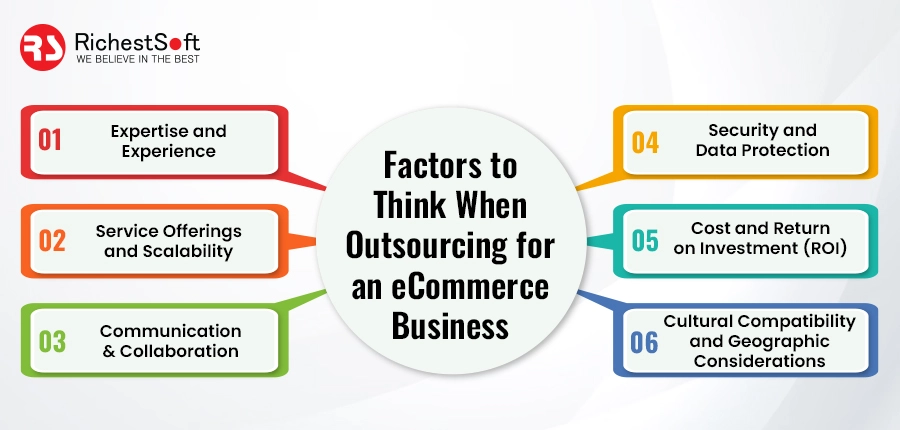
Outsourcing has become a prevalent strategy for eCommerce businesses looking to optimize their operations, increase efficiency, and focus on core competencies. Companies can tap into specialized knowledge and resources by entrusting specific tasks or processes to external experts, ultimately driving growth and success. However, finding the right outsourcing partner requires careful consideration of various factors. Here, we can explore the crucial factors to consider while outsourcing an eCommerce business. With knowledge and comparing those factors, you can make informed selections and select the precise outsourcing solution for your needs.
1. Expertise and Experience
One of the critical factors to consider when outsourcing for your eCommerce business is the expertise and experience of the outsourcing provider. Assess their track record, portfolio, and client testimonials to gauge their level of proficiency in eCommerce operations. Look for partners who deeply understand your industry, relevant technologies, and best practices. A specialized outsourcing provider with a proven track record can bring valuable insights and contribute significantly to the success of your eCommerce venture.
2. Service Offerings and Scalability
Consider the range of services delivered by the outsourcing provider. Ensure they meet your specific requirements, whether it involves website development, order fulfillment, customer support, digital marketing, or inventory management. Additionally, consider the scalability aspect. As your eCommerce business grows, you may need to expand or adapt your outsourcing requirements—partner with a provider that can scale their services and accommodate your evolving needs.
3. Communication & Collaboration
Effective communication & partnership are prime when working with an outsourcing partner. Ensure the provider has a streamlined communication process and is accessible through various channels. Clear and prompt communication helps align goals, address concerns, and maintain a productive working relationship. Look for providers who value transparency, regular reporting, and proactive engagement, as these factors contribute to successful outsourcing partnerships.
4. Security and Data Protection
eCommerce businesses deal with sensitive customer information, payment details, and proprietary data. Therefore, security and data protection should be top priorities when selecting an outsourcing partner. Evaluate the provider’s security protocols, certifications, and compliance with industry standards such as PCI-DSS (Payment Card Industry Data Security Standard). Ensure they have robust measures to safeguard your data and mitigate potential risks.
5. Cost and Return on Investment (ROI)
While cost has not to be the only figuring-out factor, comparing the monetary aspects of outsourcing is major. Evaluate pricing models, service packages, and the providers’ standard fee proposition. Remember the potential return on investment (ROI) that outsourcing can deliver. Look beyond the upfront charges and assess the long-term blessings, which include improved operational Performance, scalability, and revenue growth. Proper stability between price and value is vital for a hit outsourcing arrangement.
6. Cultural Compatibility and Geographic Considerations
If you choose to outsource internationally, consider cultural compatibility and geographic considerations. Consider the ecommerce outsourcing provider’s language proficiency, time zone compatibility, and cultural awareness. Effective communication and cultural alignment can significantly impact collaboration and the overall success of your partnership.
Also Read: IT Outsourcing Cost in 2023
Benefits of eCommerce Outsourcing

1. Access to Specialized Expertise:
Ecommerce outsourcing allows businesses to tap into the expertise of professionals specializing in online operations. Whether it’s website development, digital marketing, order fulfillment, or customer support, outsourcing brings specialized knowledge and experience, improving Performance and results.
2. Cost Savings and Efficiency:
Outsourcing ecommerce services can help businesses reduce costs significantly. Employing outsourcing non-centre capabilities and inventory management or logistics, companies can store hiring and training costs, infrastructure fees, and ongoing operational prices. Moreover, outsourcing allows companies to streamline techniques, boom performance, and awareness of core competencies, improving productivity and profitability.
3. Scalability and Flexibility:
Ecommerce companies frequently revel in fluctuations in demand, specifically during peak seasons or promotional intervals. Outsourcing permits organizations to scale their operations up or down quickly, depending on the call. Outside service providers can seamlessly adjust their resources and abilities, ensuring agencies can care for extended site visitors, transactions, and purchaser desires without compromising first-class or efficiency.
4. Time and Speed to Market:
Time to market is crucial in the competitive ecommerce landscape. Outsourcing ecommerce services can expedite the development and launch of online stores, enabling businesses to capitalize on market opportunities quickly. With the expertise and experience of outsourcing partners, companies can overcome potential development setbacks and launch their ecommerce platforms sooner, gaining a competitive edge.
Popular Services of eCommerce Outsourcing
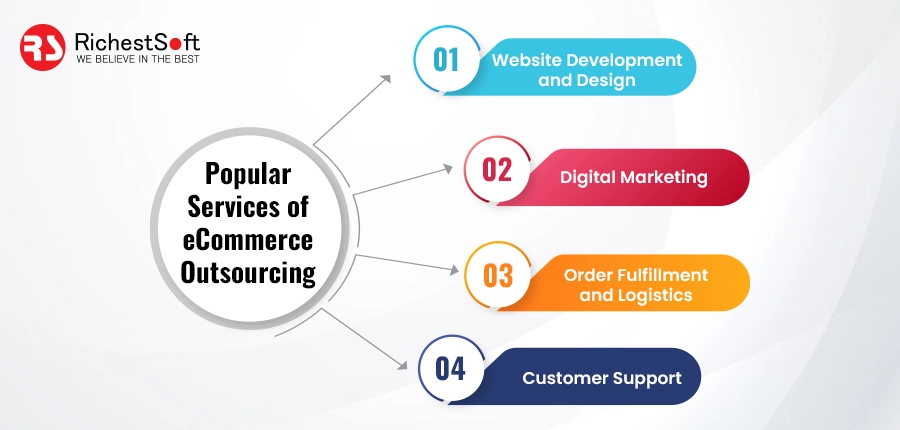
1. Website Development and Design:
Creating an attractive, user-friendly, and optimized ecommerce website requires specialized skills. Outsourcing website development and design ensures businesses have a visually appealing and functional online store with an exceptional user experience.
2. Digital Marketing:
When businesses engage external help for their digital marketing efforts, they may outsource tasks such as PPC advertising, social media marketing, SEO, and content marketing. It can improve their online visibility on search engines, draw more visitors, and boost conversions.
3. Order Fulfillment and Logistics:
Managing order fulfillment and logistics can be challenging and time-consuming. However, outsourcing ecommerce services to third-party logistics providers facilitates businesses to satisfy their expertise and infrastructure, providing customers obtain their orders promptly and efficiently.
4. Customer Support:
By outsourcing customer support services for ecommerce, businesses can offer customers round-the-clock assistance via live chat, email, and phone support. This can boost customer satisfaction & loyalty.
Challenges of eCommerce Outsourcing
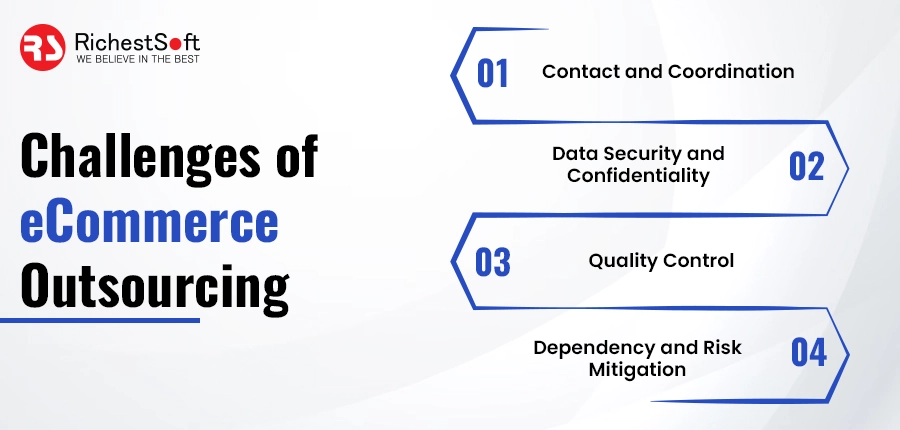
1. Contact and Coordination:
Adequate communication & coordination between the outsourcing partner and the business are essential for successful cooperation. Overcoming language barriers, time zone differences and maintaining consistent communication can pose challenges.
2. Data Security and Confidentiality:
Entrusting sensitive customer data and proprietary information to an outsourcing partner raises concerns about data security and confidentiality. Businesses must ensure robust security measures and that the outsourcing partner adheres to industry standards and regulations.
3. Quality Control:
Maintaining quality control over outsourced services is crucial. Businesses must establish clear performance metrics, regularly monitor and evaluate the outsourcing partner’s work, and ensure service levels meet their expectations.
4. Dependency and Risk Mitigation:
Outsourcing involves relying on external providers for critical functions. Businesses must have contingency plans and risk mitigation strategies to address potential disruptions, such as changes in the outsourcing partner’s capabilities or unforeseen circumstances.
Also Read: Inhouse Vs Outsourcing: How to Decide What’s Right for You
Best Practices for Successful eCommerce Outsourcing
Ecommerce outsourcing has become a popular strategy for businesses to optimize their operations, tap into specialized expertise, and drive growth in the competitive online marketplace. However, to ensure a successful outsourcing experience, following best practices that maximize the benefits and mitigate potential challenges is essential.
Here, we will explore the best practices for successful ecommerce outsourcing, empowering businesses to make informed decisions, establish effective partnerships, and achieve their desired outcomes.
Let us dive in and uncover the crucial practices that can elevate your ecommerce outsourcing journey.
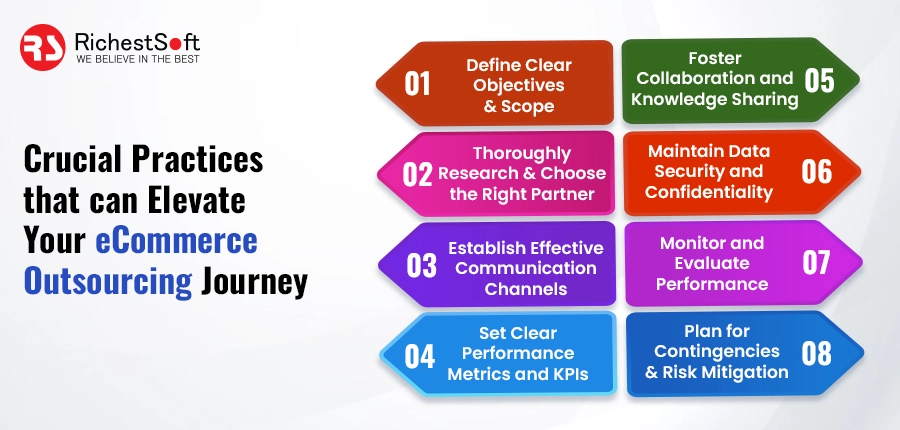
1. Define Clear Objectives and Scope
Before embarking on an outsourcing partnership, clearly define your objectives, goals, and scope of work. Pinpoint the detailed tasks or processes you want to outsource and articulate your expectations. A well-defined scope helps select the right outsourcing partner, set clear performance metrics, and ensure alignment between your business goals and the outsourced activities.
2. Thoroughly Research & Choose the Right Partner
Execute thorough research & due persistence when selecting an outsourcing partner. Evaluate their expertise, experience, track record, and client testimonials. Look for partners who specialize in ecommerce outsourcing and have a deep understanding of your industry and target market. Consider their capabilities, infrastructure, and the quality of their services. A well-aligned outsourcing partner can significantly contribute to the success of your ecommerce venture.
3. Establish Effective Communication Channels
Establishing effective communication channels is crucial for successful ecommerce outsourcing. Confirm that there is transparent communication between your business and the outsourcing partner. Define the frequency and mode of communication, whether it’s through email, video conferencing, project management tools, or regular meetings. Prompt and transparent communication helps maintain alignment, address concerns, and foster a collaborative relationship.
4. Set Clear Performance Metrics and KPIs
Establish clear performance metrics and key performance indicators (KPIs) to measure the success of the outsourced activities. These metrics should align with your business goals and reflect the desired outcomes. Regularly observe and assess the Performance of the outsourcing partner against these metrics. It helps identify improvement areas, address issues, and ensure that the outsourcing arrangement delivers the expected results.
5. Foster Collaboration and Knowledge Sharing
Promote collaboration and knowledge sharing between your internal team and the outsourcing partner. Facilitate the discussion of ideas, best practices, and lessons learned. This collaborative approach helps leverage the outsourcing partner’s expertise while incorporating your internal knowledge and insights. Regular communication and collaboration foster a sense of partnership and drive continuous improvement.
6. Maintain Data Security and Confidentiality
Data security and confidentiality are critical considerations in ecommerce outsourcing. Guarantee the outsourcing partner has dynamic security standards to protect sensitive customer information, proprietary data, and intellectual property. Establish non-disclosure agreements (NDAs) and contractual provisions to safeguard your business interests. Regularly assess and monitor the security protocols of the outsourcing partner to ensure compliance with industry standards and regulations.
7. Monitor and Evaluate Performance
Continuously monitor and evaluate the Performance of the outsourcing partner throughout the engagement. Regularly review progress against the defined metrics and KPIs. Provide feedback & manage any issues or problems promptly. This proactive approach allows for timely adjustments and quality improvements and ensures that the outsourcing partner remains aligned with your business objectives.
8. Plan for Contingencies and Risk Mitigation
Develop contingency plans and risk mitigation strategies to address potential disruptions in the outsourcing arrangement. Anticipate challenges such as changes in the outsourcing partner’s capabilities, resource constraints, or unforeseen circumstances. Establish backup plans, alternative resources, and contingency measures to minimize any potential impact on your ecommerce operations.
The Future of eCommerce: Embracing Innovation and Transformation
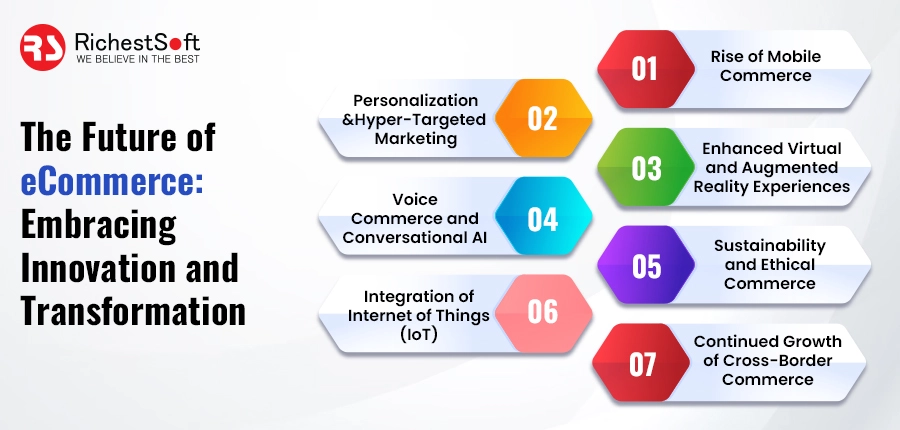
The eCommerce industry has witnessed remarkable growth and transformation in recent years, fueled by technological advances, changing consumer behaviors, and the global shift towards digital commerce. As we gaze into the future, it becomes evident that the eCommerce landscape will continue to evolve and shape how we buy and sell goods online. Here, we will explore what the future holds for the eCommerce industry and the key trends and innovations that will define its trajectory. Let us essay on a journey into the fascinating future of eCommerce.
1. Rise of Mobile Commerce
Mobile commerce, or m-commerce, is set to dominate the eCommerce landscape in the coming years. With the across-the-board adoption of smartphones and tablets, customers increasingly use mobile phones for online shopping. The future of eCommerce lies in creating seamless and user-friendly mobile experiences, optimizing websites and applications for mobile devices and integrating technologies like mobile wallets and contactless payments to facilitate quick and secure transactions.
2. Personalization and Hyper-Targeted Marketing
Personalized shopping experiences and hyper-targeted marketing will mark the future of eCommerce. Businesses can use data analytics, artificial intelligence (AI), and machine learning to understand customer preferences, behaviors, and purchase patterns on an individual level. It will enable them to deliver personalized product recommendations, customized offers, and tailored shopping experiences, enhancing customer engagement and loyalty.
3. Enhanced Virtual and Augmented Reality Experiences
Augmented reality (AR) & Virtual reality (VR) technologies can revolutionize how consumers interact with products online. In the future, eCommerce platforms will leverage these technologies to offer immersive virtual shopping experiences, allowing customers to visualize and try products before purchasing. AR will enable consumers to overlay virtual objects onto the real world, enhancing decision-making and reducing the need for returns.
4. Voice Commerce and Conversational AI
The increasing adoption of voice assistants and smart speakers will drive the growth of voice commerce in the future. Consumers can purchase, reorder, and inquire about product details through voice commands. eCommerce businesses will integrate conversational AI technologies like chatbots and virtual assistants to provide instant and personalized customer support, answer queries, and facilitate seamless transactions.
5. Sustainability and Ethical Commerce
As environmental concerns continue to gain prominence, the future of eCommerce will witness a growing emphasis on sustainability and ethical commerce. Customers are becoming more aware of their purchases’ environmental impact and demanding eco-friendly and ethically sourced products. eCommerce businesses must adopt sustainable practices, offer green alternatives, and transparently communicate their commitment to social and environmental responsibility.
6. Integration of Internet of Things (IoT)
Integrating Internet of Things (IoT) devices with eCommerce will unlock new opportunities in the future. IoT-enabled devices, such as smart home appliances and wearable devices, will seamlessly connect with eCommerce platforms, enabling personalized product recommendations, automatic reordering, and real-time inventory management. This integration will enhance convenience, efficiency, and the overall customer experience.
7. Continued Growth of Cross-Border Commerce
The future of eCommerce will witness a further expansion of cross-border commerce. Advancements in logistics, international payment systems, and global trade policies will enable businesses to reach customers worldwide easily. The globalization of eCommerce will present opportunities for businesses to tap into new markets, while consumers will benefit from a wider variety of products and competitive pricing.
Also Read: Why Outsourcing to India is Important for Mobile App Development?
What is the Cost of Hiring eCommerce Developers?
When building a successful e-commerce platform, hiring skilled developers is crucial. The expertise and experience of these professionals play a significant role in creating a seamless and functional online store. However, one major consideration businesses must address is the cost of hiring eCommerce developers. Here, we will explore the factors influencing the cost of hiring eCommerce developers and provide a comprehensive table outlining the average cost ranges based on different factors. Let’s dive in and understand the costs associated with hiring eCommerce developers.
Factors Affecting the Cost of Hiring eCommerce Developers
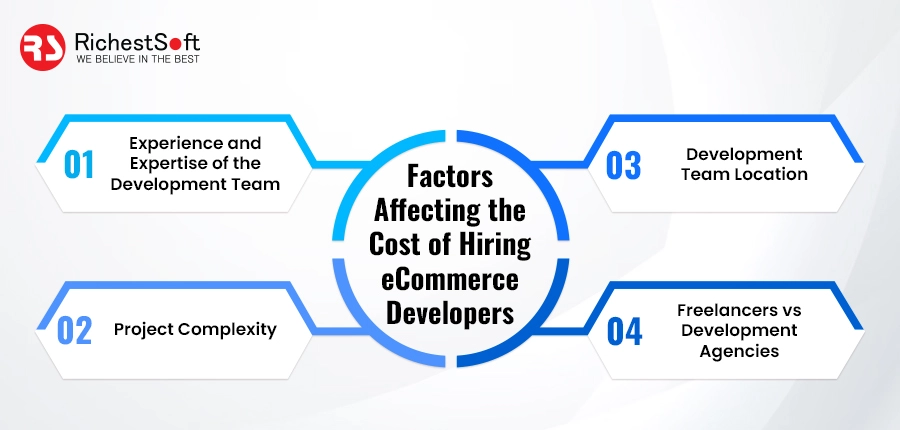
1. Experience and Expertise of the development team:
The level of experience and expertise required from the developers significantly impacts the cost. Developers with extensive knowledge of e-commerce frameworks, such as Magento, Shopify, or WooCommerce, and proficiency in front and backend development tend to command higher rates.
2. Project Complexity:
The complexity of the e-commerce project influences the cost of hiring developers. Customizing and integrating complex features, such as payment gateways, inventory management, CRM systems, or multi-channel selling, may require developers with specialized skills, resulting in higher costs.
3. Development team Location:
The geographical location of the developers also plays a role in determining the cost. Developers based in regions with higher living expenses, such as North America or Western Europe, generally charge higher rates than developers from locations with lower living costs, such as Eastern Europe, Asia, or South America.
4. Freelancers vs Development Agencies:
Choosing between hiring freelancers or development agencies can affect costs. Freelancers often charge lower hourly rates compared to development agencies. Still, agencies provide the advantage of a team with diverse skill sets, project management, and support, which may result in higher overall costs.
Average Cost Ranges for Hiring eCommerce Developers
| Experience Level | Average Hourly Rate |
|---|---|
| Junior Developer | $20 – $40 |
| Mid-level Developer | $40 – $80 |
| Senior Developer | $80 – $150 |
Please note that these rates are approximate and can differ based on the factors stated above, as well as the specific requirements of your project. The rates listed here are a general guideline to give you an idea of the average cost ranges.
Why is RichestSoft the Ideal Option for eCommerce Outsourcing?
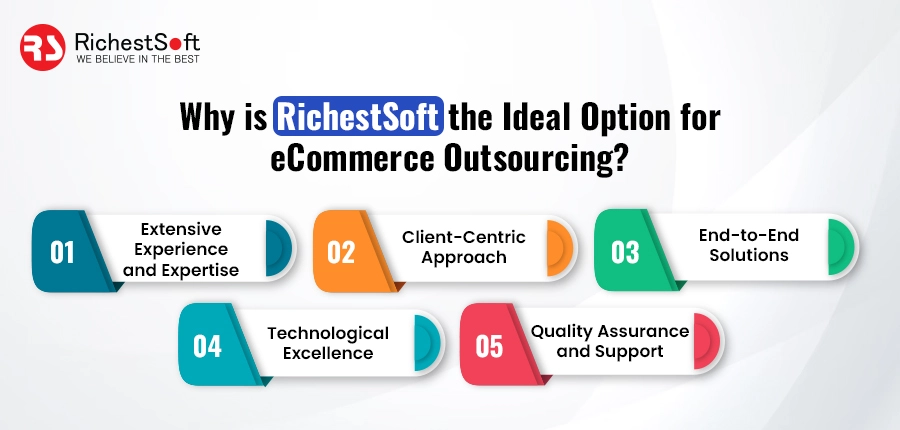
Outsourcing eCommerce services can help businesses optimize operations and drive growth. RichestSoft is a reliable partner for eCommerce outsourcing, offering top-notch solutions and a client-centric approach. Companies worldwide trust RichestSoft for exceptional results.
➡️ Extensive Experience and Expertise
➡️ Client-Centric Approach
➡️ End-to-End Solutions
➡️ Technological Excellence
➡️ Quality Assurance and Support
RichestSoft prioritizes quality assurance and rigorous testing to meet high standards. Ongoing support and maintenance ensure lasting partnerships and peace of mind for businesses.
Also Read: Why Outsourcing to India is Important for Mobile App Development?
FAQs
Q1: What exactly is eCommerce outsourcing?
Ans: Ecommerce outsourcing involves delegating various operational aspects of your online business to external service providers. It can include website development, digital marketing, order fulfillment, customer support, inventory management, and more. By outsourcing these functions, businesses can tap into specialized expertise, save costs, increase efficiency, and focus on core business objectives.
Q2: What are the benefits of outsourcing eCommerce?
Ans: Outsourcing eCommerce brings numerous benefits, including access to specialized expertise, cost savings, scalability, improved efficiency, and faster time to market. It allows businesses to leverage external resources, streamline operations, and focus on core competencies, enhancing productivity and overall business growth.
Q3: Which eCommerce services are commonly outsourced?
Ans: Popular services commonly outsourced in eCommerce include website development and design, digital marketing (SEO, PPC, social media), order fulfillment and logistics, inventory management, customer support, data entry, content creation, and more. The specific services you outsource depend on your business needs and goals.
Q4: How do I choose the right outsourcing partner for my eCommerce business?
Ans: Selecting the right outsourcing company is essential for success. When selecting a partner, consider their expertise, experience, track record, client testimonials, and cultural compatibility. Evaluate their ability to meet your specific requirements and ensure effective communication channels. Perform thorough analysis and due persistence to make an informed decision.
Q5: What are the potential challenges of outsourcing eCommerce?
Ans: While outsourcing offers numerous benefits, there can be challenges to navigate. These may include communication issues, data security concerns, quality control, and dependency on external providers. However, these challenges can be managed by establishing clear communication, implementing robust security measures, setting performance metrics, and maintaining open collaboration with the outsourcing partner.
Q6: How do I ensure a successful outsourcing partnership?
Ans: To ensure a successful outsourcing partnership, it is crucial to define clear objectives, establish effective communication channels, set performance metrics, and monitor the progress regularly. Foster collaboration, provide timely feedback and address any concerns promptly. You can foster a productive and long-term outsourcing partnership by maintaining transparency, mutual trust, and regular evaluation.
Also Read: Benefits of Outsourcing Software Development
Conclusion
In this ultimate guide to outsourcing eCommerce for maximum results, we have explored the numerous benefits, popular services, and best practices associated with outsourcing in the eCommerce industry. By leveraging the expertise and resources of external partners, businesses can optimize their operations, reduce costs, and drive growth in the highly competitive online marketplace. From website development and digital marketing to order fulfillment and customer support, outsourcing offers a comprehensive solution for businesses of all sizes.
Successful eCommerce outsourcing requires careful planning, effective communication, and ongoing performance evaluation. Businesses can unlock their eCommerce potential and achieve maximum results by choosing the right outsourcing partner, setting clear objectives, and establishing strong collaboration.
As the eCommerce landscape evolves, embracing emerging technologies and trends such as mobile commerce, personalization, and sustainability will be crucial for staying ahead. By implementing the insights and strategies outlined in this guide, businesses can navigate the complexities of eCommerce outsourcing and position themselves for long-term success. So, seize the opportunities, embrace strategic partnerships, and embark on a transformative outsourcing journey to drive your eCommerce business to new heights.
 +1 315 210 4488
+1 315 210 4488 +91 798 618 8377
+91 798 618 8377


